By Sonja Heyck-Merlin
Photos courtesy of Mark McBrine
Monday is pasta night at Mountain View Correctional Facility in Charleston, Maine. And it isn’t SpaghettiOs or canned ravioli. There are two kitchens and two dining halls on the sprawling hilltop campus where on clear days Katahdin can be seen looming in the distance. One facility is medium security; the other is minimum security and pre-release. Five years is the maximum amount of time residents can be incarcerated.
On pasta days, each kitchen crew — a combination of corrections officers trained in food service and residents — pull bagged whole tomatoes from walk-in freezers, run them under water, take the skins off, and set to simmering huge pots of sauce. They need enough to make, on average, 400 servings, meaning the kitchens provide about 1,200 meals every day of the year.
Transforming the tomatoes into sauce isn’t the only time the tomatoes pass through residents’ hands. They also help to raise the seedlings, transplant them into beds in Mountain View’s 5 acres of organic gardens and then harvest the fruits. Hands then lift the aromatic sauce to mouth, and finally those hands scrape the remnants into containers for compost, destined to become fertility for the garden beds.
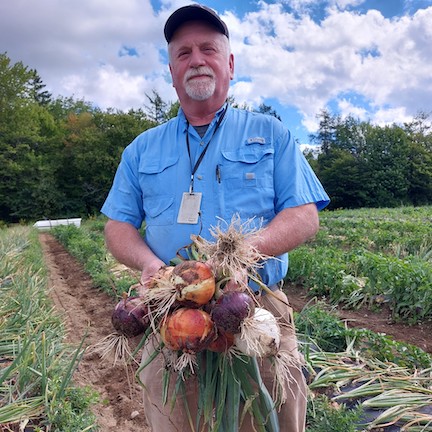
Like the tomatoes, Mark McBrine, the director of food service at Mountain View and the inspiration behind the gardening program, took a roundabout journey to his current position. As a child, McBrine was imprinted with farm life curiosities: muddy piglets, fresh eggs and greasy lanolin-rich wool.
“Specifically, my mother’s dad was a very diversified farmer, kind of like the days of New England. He had 18 milking cows, quite an extensive flock of sheep, raised pigs and had a couple hundred laying hens. And that was where I pretty much grew up from the time I got out of school in the spring till the time I went back in the fall,” McBrine says.
Eventually, after careers in food service, hospitality and general contracting, he returned to his roots — operating a diversified farm for 12 years with his wife, seven children and his parents. It was a hustle, which was upended when McBrine’s dad was diagnosed with cancer and the family took turns providing around-the-clock care.
At this point, the vagaries of farm life were incompatible with his family commitments. He says, “I just had to go and get something that was consistent.” A former co-worker, who had a hunch that McBrine would end up in the kitchen, suggested a career at Mountain View, and in 2010 McBrine was hired as a corrections officer. Within two years, he was working in the kitchen, eventually becoming the food service manager and making bold changes each step of the way. McBrine also serves as a kitchen and garden consultant for some of Maine’s other correctional facilities.
When he started in the kitchens it was Wonder Bread-style baked goods, preformed chicken patties and frozen egg products — the types of processed foods prisons are notorious for. According to the nonprofit Impact Justice: “Prisons function as out-of-sight food deserts, perpetuating patterns of poor health in communities that already experience profound inequities. The growing movement for food justice will not be complete until it reaches inside prisons and jails.”
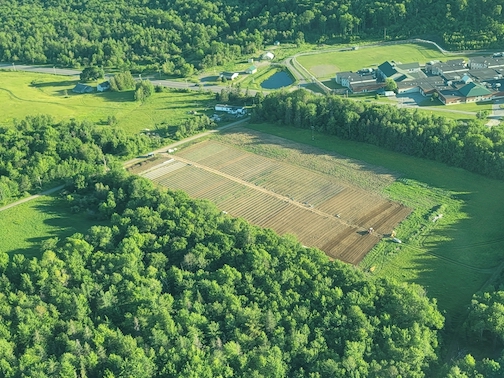
McBrine and the state of Maine concur. The Maine Department of Corrections (MDOC), under the current leadership of Randall Liberty, are taking on these food inequities at Maine’s seven adult correctional facilities and one youth facility — creating cooking and baking apprenticeships, building compost piles and raised beds, mixing potting soil and giving residents the chance to get their hands dirty.
Beyond addressing food justice in Maine’s correctional facilities, preparing better food and organic gardening make economic sense according to McBrine. Most kitchen managers operate under budget constraints, and McBrine stepped into the Mountain View kitchens with the insight he gleaned from feeding his family of nine.
“One thing I did learn is that if you can take whole foods and use whole foods to make meals and not do prefab types of things, then savings can come about by doing that. A lot of times what was happening was just convenience being chosen,” McBrine says.
In the Mountain View kitchens, for example, he ditched the frozen french fries, hash browns and tater tots and started buying 50-pound bags of Maine potatoes, transforming the workhorse of a vegetable into freshly cut french fries, home fries and salad. He also proved that buying eggs from Maine farms was less expensive than the frozen option. Cheese ends and seconds from Pineland Farms were cheaper than bags of pre-grated cheese.
Another way he found to save money was eliminating the purchase of bread products and desserts, replacing the processed varieties with made-from-scratch sub rolls, hamburger buns, bagels, English muffins and a litany of sweets.
“Six years ago, I started a baking apprenticeship. We do it all from scratch, and we’ve never missed a day in a little over six years. And that saved us anywhere from $30-40 every meal,” McBrine says. Some of their flour is from Skowhegan-based Maine Grains. Mountain View purchases run-of-the-mill — a mixture of grains created when equipment is cleaned out — which Maine Grains sells to them at a discount.
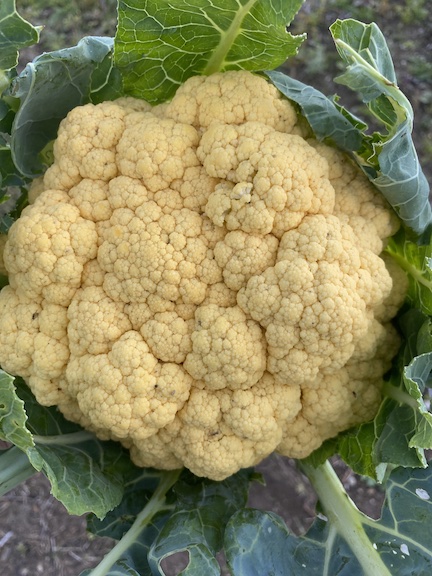
Beyond addressing food justice in Maine’s correctional facilities, preparing whole foods grown on site, or sourced from around the state, makes economic sense to McBrine. Prepping foods in the kitchen, such as cutting potatoes into fries themselves and baking bread from scratch, has resulted in cost savings. In 2018, there was a kitchen budget surplus of $142,000.
In 2018, there was a kitchen budget surplus of $142,000. McBrine was allowed to use some of the funds to purchase labor-saving kitchen equipment, such as a Sammic processor capable of processing 2,200 pounds of bulk potatoes per hour. The machine is also used for other vegetable and fruit prep.
At this point in his tenure, he’d already dabbled in agriculture-related enterprises: building some raised beds at Mountain View and establishing a food waste composting program at the Maine State Prison in Warren. Briefly, he managed a conventional orchard in Charleston, which Mountain View leased for a few years.
Whole food cooking is one of McBride’s guiding life principles and, to him, organic farming goes hand-in-hand with his cooking philosophy. For McBrine, human health begins with soil health — the basic tenet of organic agriculture. In 2018, he received permission from the MDOC and Maine Department of Inland Fisheries & Wildlife to use a piece of the adjacent Bud Leavitt Wildlife Management Area for a larger farming enterprise.
The land was fallow and burdened with indicators of low fertility like ferns and bedstraw, but at least it had been mowed occasionally. For the initial tillage, McBrine used his own equipment. Then, he worked to jumpstart the biological activity of the soil by spreading compost and keying in on calcium levels. Mountain View produces 150 to 200 yards of compost annually — a mixture of food scraps, shredded cardboard, chicken manure from a small flock of laying hens, and shavings and debris from the sawmill and wood products enterprises at the facility.
“We feed the plants. We feed the soil. We make an environment for the biological activity to want to be there. And once we do that, we’re basically trying to build the immune system of the plants, so they will fend off disease and insects without having to have any interventions. We don’t use pesticides or herbicides,” McBrine says.
They started with a few acres, growing on permanent raised beds with 6-foot centers: the same style employed on McBrine’s family farm. Since the initial tillage, the only soil agitation is from a BCS walk-behind rototiller. In 2022, they harvested 70,000 pounds of vegetables on 4 acres. Next season, they’ll have the full 5 acres in production, and McBrine hopes to produce 100,000 pounds of produce for the Mountain View kitchens.
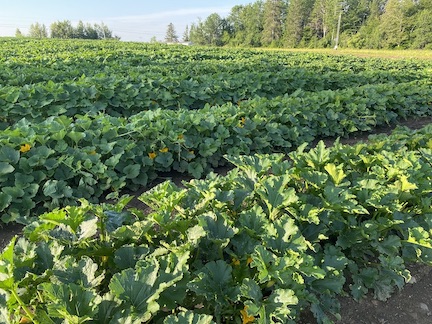
They raise all of their own seedlings using McBrine’s custom potting mix, and because the mix has produced such vigorous seedlings, all the corrections facilities in Maine will use it moving forward. McBrine credits Mark Fulford for introducing him to the veterans of organic agriculture — Eliot Coleman, Gary Zimmer, Arden Andersen, the late Jerry Brunetti and others — whose knowledge allowed him to develop the potting mix and build the health of the soil on Charleston hill.
The gardens are a tapestry of color, texture and variety. If McBrine and the farm crew — typically three to ten people — were to head to a farmers’ market with their produce, their stand would rival those of other successful organic growers.
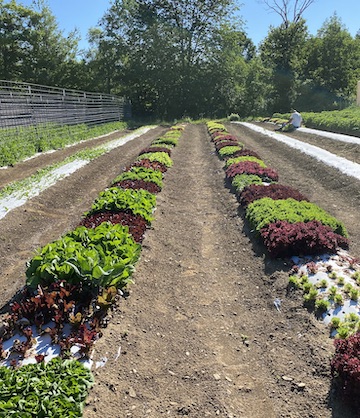
“Each season, we’re growing at least six different plantings of 19 varieties of head lettuce,” McBrine says. “We do sugar snaps, three kinds of pole beans: yellow, purple and green. We do six different kinds of kale and 11 different varieties of leeks, shallots and onions.” Then, there are the tomatoes, peppers, sweet potatoes, cucurbits, brassicas and some specialty crops like tomatillos. One popular meal is a chicken enchilada soup featuring those field-ripened tomatillos. McBrine says, “We try to have a variety that is going to make the biggest difference in the plates of the residents.”
There are many occupational training opportunities at Mountain View and residents can specialize depending on their experience and interests. Competing with the gardens are the auto shop, sawmill and kitchen as well as businesses in the local community that employ close-to-release residents. So, it’s not a huge percentage of residents that are farming, but for those who do, McBrine believes it has been an encouraging experience.
Jessee Mackin, a resident farm worker of two years who puts in 45-50 hour weeks during the peak of the growing season, agrees. “What we do on the ag side is actually benefiting everybody that is here because it’s all healthy and stuff. I like what I do. I never knew anything about agriculture until I started working here. I didn’t know what acorn squash was. It’s been a really good experience,” Mackin says.
Through the hard work of a few, all residents have access to fresher, healthier food. McBrine gives a lot of credit to the kitchen and agricultural staff, who in shorthanded situations have often taken on the added work of preparing the harvest for use in meals.
“There aren’t many individuals, let alone whole crews who would take this added task on without complaint,” McBrine says. “Their positive attitude has affected the resident staff, and they are now passing that along to fellow residents that they are mentoring as their replacements. Their willingness to go the extra mile without added compensation has allowed a model to be created that hopefully will inspire others to do the same.”
With this stellar team, McBrine reckons he can do more to improve the food and the kitchens’ bottom lines. One piece of needed infrastructure is a well for the fields and a drip irrigation system. Currently, the crew waters by hand and only when necessary. Another piece missing from this farm-to-table system is a processing facility with more freezer space and additional equipment. McBrine envisions making salsas, jams and pickles. But beyond that, there is surplus going to waste on Maine farms that Mountain View could process — seconds tomatoes, ugly carrots and misshapen apples — which could further reduce costs.
In 2014, the state of Maine passed legislation to increase the consumption of Maine food in its state institutions, such as universities, hospitals and correctional facilities (schools participating in the National School Lunch Program are exempt). This bill established a minimum percentage of Maine foods, including milk and eggs, that must be purchased: 15% by 2021, 20% by 2026, 25% by 2036 and 35% by 2037. At Mountain View, McBrine has already met the 2037 requirement, purchasing 35.8% of its food from Maine producers during the first six months of fiscal year 2022/23.
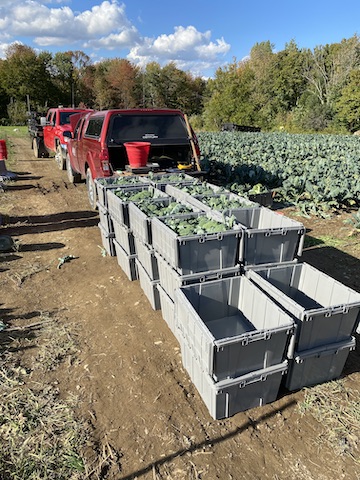
These efforts, by McBrine and the state of Maine, don’t go unnoticed. The 2020 Impact Justice report “Eating Behind Bars: Ending the Hidden Punishment of Food in Prison” lauded Maine’s efforts to put nutritious food into the hands of Maine’s corrections’ residents. Many major U.S. news outlets covered the report’s publication, seeking quotes from Liberty and McBrine.
In early 2021, independent filmmaker Max Armstrong was scrolling through his newsfeed and read an article about the Mountain View garden project. The story married two of his passions: prison reform and organic farming. As a senior at Chicago’s DePaul University, Armstrong took a class in restorative justice, spending each Friday studying with the residents of a maximum security prison. After graduating, he hitchhiked through Canada and worked on organic farms.
Realizing the cinematographic potential of this story, Armstrong couldn’t get the article from his mind. He called McBrine. “Within an hour of speaking with him I was on the phone with Randall Liberty, and he immediately wanted to give us full access to help tell the story,” says Armstrong.
Armstrong was filming on one of McBrine’s first days tilling up the thatch on Charleston hill in the spring of 2021. Over the next two years, he collected 50 hours of footage — capturing the seasonal progression of the gardens and the personal journeys of some residents.
In early 2023, Armstrong, in the process of editing the film, had plans to eventually show it at film festivals; he also hopes to distribute the documentary through the New England public broadcasting system. Equally important to Armstrong is to provide access to the film to incarcerated people. He wants this positive story to be in the hands of the incarcerated and to maybe inspire a few to use those hands in the soil, in their facility’s kitchen, or someday as a career.
“Our hope is that by telling this story, we will not only inspire the Maine Department of Corrections to double-down on its whole food effort but also serve as a source of encouragement for other institutions to enact structural change in their food systems,” Armstrong says.
On New Year’s Day of 2023, Mountain View was riddled with colds and respiratory viruses. The primary resident cook decided to serve a soup made with a hearty broth, frozen Swiss chard and kale from the gardens, and some mushrooms from a local grower. “He made a super soup. I can tell you that four or five years ago that wouldn’t have been on the horizon. Putting together something super healthy when people have been sick — on his own, with no suggestion from myself or any staff — is very encouraging to me as someone who has long promoted food as medicine,” McBrine says.
About the author: Sonja Heyck-Merlin is a regular feature writer for The MOF&G. She and her family own and operate an organic farm in Charleston, Maine.
This article originally appeared in the spring 2023 issue of The Maine Organic Farmer & Gardener.
